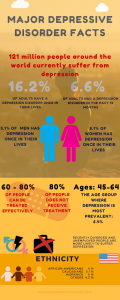Major Depression Symptoms
Almost everyone has a period in their life in which he experiences feelings of sadness, emptiness or unhappiness. At these moments people prefer to stay at home in bed and cancel all appointments for the day. On such days, it is difficult to enjoy small things and to stay focused on a task for a while. These symptoms could be depression symptoms. ‘Depressive’ periods like these, vary per person in intensity (some people feel generally miserable while others suffer from severe depression symptoms) and duration (a few weeks to several years). Someone may experience some of the depression symptoms listed below mildly for about a year or two, while someone else may experience some of the symptoms severely for only a few months. Furthermore, for some people it is difficult to understand why they feel so sad, empty or unhappy. For many of us answering this why-question already takes too much energy. The depression symptoms easily overlap with several other illnesses, disorders or issues. Therefore professional therapists, psychiatrists and doctors carefully diagnose depression using these depression symptoms before they jump into conclusions and offer you ‘random’ treatments.
At Barends Psychology Practice, we treat various types of depression. Interested? Make an appointment for a first session now! Go to contact us. (Depending on your health insurance, treatment may be reimbursed)
Quick jump-to menu:
Depression symptoms
During such periods the depression symptoms occur most of the day and nearly every day and may include:
- Feelings of sadness, emptiness or unhappiness
- Outburst of anger, frustration or irritability, even over minor things
- Loss of pleasure or interest in daily activities, such as making breakfast or grocery shopping
- Difficulty sleeping, sleeping too much or too little (insomnia)
- Being tired all the time and lack of energy
- Changes in appetite: often loss of appetite and weight, or sometimes increased appetite and weight gain
- Restlessness, anxiety or agitation: inability to sit still or excessive worrying
- Slowed talking, thinking or body movements
- Feelings of guilt or worthlessness, blaming yourself for things you are not responsible for, fixating on previous failures
- Trouble concentrating, focusing, making decisions and remembering things
- Thoughts of death, suicidal thoughts and/or attempts or suicide
- Unexplained physical problems, such as headaches
(Avertisement. Please scroll down to continue reading.)
Please note that it is also possible for people around you to notice these depression symptoms in you or your behaviour. It can be difficult to analyse your own behaviour and feelings when you suffer from the depression symptoms. For the DSM-IV diagnostic criteria of depression, please read: diagnosing depression. In case you think you might be depressed, do not hesitate and Contact me for an appointment.
Some depression types, such as bipolar disorder, have different depression symptoms. Don’t forget to read about interesting depression facts.
Depression differences between men and women:
Men when depressed:
- Cope differently with depression symptoms.
- More often turn to alcohol or drugs.
- More often become angry and irritable
- More often become discouraged and frustrated.
- Admit sooner: loss of interest in once liked activities.
- Admit sooner: sleep disturbances, irritability and fatigue.
- More often engage in reckless behaviour.
- More often become a workaholic to avoid the depression topic at home.
Women:
- Depression is more common among women.
- Delivery and menopause increase depression chance.
- Admit sooner: feelings of sadness, worthlessness & guilt.
- More often face additional stress of work and home.
- Biological, hormonal and psychosocial factors may increase depression chance.
(Avertisement. Please scroll down to continue reading.)
When to see a doctor
If you recognize some of the above stated depression symptoms, make an appointment to see your doctor, psychologist or psychiatrist. You can also schedule a free of charge first online counseling session with the online therapist of Barends Psychology Practice.
Depression symptoms get worse over time. Untreated depression can lead to other physical and mental health problems, or cause problems in other areas of your life (work, social). Feeling depressed could even lead to suicide.
What can I do when I have suicidal thoughts?
Immediately reach out to a professional (doctor, psychiatrist or psychologist) or a close friend or loved one. Schedule an appointment with a professional and talk about your feelings. Read more about suicide and depression.
For more information:

